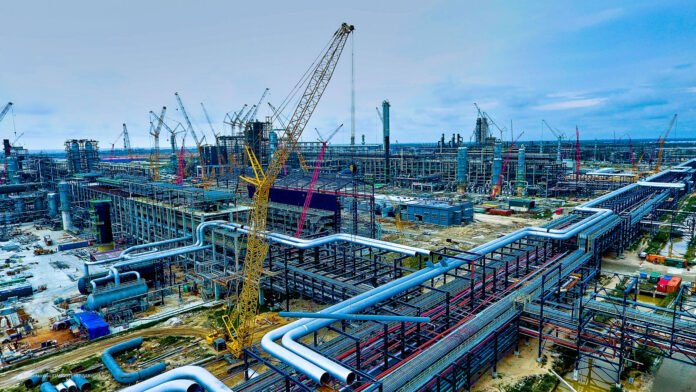Dangote Petroleum Refinery has strongly rejected claims by the Nigerian National Petroleum Company Limited (NNPCL) that its $1 billion crude-backed loan was instrumental in financing the 650,000 barrels-per-day (BPD) refinery. In a detailed statement, the refinery clarified that the loan constitutes only 5% of the total investment in the project, labeling NNPCL’s assertions as inaccurate and misleading.
Breaking Down NNPCL’s Claim
During a stakeholder engagement meeting on Monday, Olufemi Soneye, NNPCL’s Chief Corporate Communications Officer, announced that the company had secured a $1 billion crude-backed loan to support the Dangote Refinery. Soneye highlighted this as part of NNPCL’s broader effort to foster public-private partnerships, advance Nigeria’s energy sector, and contribute to economic growth.
However, Dangote Refinery countered this claim, describing it as a misrepresentation of facts that distorts the true scope of NNPCL’s involvement in the project.
Dangote Refinery’s Clarifications
In a strongly worded statement titled “Addressing NNPCL’s Misinformation,” Anthony Chiejina, Group Chief Branding and Communications Officer at Dangote Industries, provided the following key clarifications:
1. Minimal Role of the Loan
The $1 billion loan secured by NNPCL accounts for only 5% of the total investment in the refinery. The bulk of funding came from private financing and internal resources, demonstrating the refinery’s robust financial backing.
“If we were struggling with liquidity challenges, this agreement would have been cash-based rather than credit-driven,” Chiejina stated.
2. Unfulfilled Equity Stake Agreement
In 2021, NNPCL proposed acquiring a 20% stake in the Dangote Refinery, valued at $2.76 billion.
- NNPCL was required to supply 300,000 barrels of crude oil daily as part of this agreement.
- Due to prior crude commitments, NNPCL was unable to meet this obligation, resulting in a reduction of its equity stake to 7.24% by June 2024.
3. Generous Payment Terms Offered
To facilitate the equity deal, Dangote Refinery offered a flexible payment plan:
- NNPCL paid $1 billion upfront.
- The remaining $1.76 billion was structured to be recovered over five years through crude oil supplies and dividends.
Why NNPCL’s Equity Was Reduced
The agreement allowed NNPCL a 12-month grace period to fulfill its crude supply obligations. However, by the deadline of June 30, 2024, NNPCL failed to meet these terms. Consequently, its equity stake was adjusted to 7.24%.
“It is inaccurate to claim that NNPCL facilitated a $1 billion investment amid liquidity challenges. Like any other business partner, NNPCL invested to acquire an ownership stake beneficial to its interests,” Chiejina emphasized.
Strategic Role of the Dangote Refinery
The Dangote Refinery, Africa’s largest single-train refinery, is a transformative project designed to:
- Enhance domestic fuel production, reducing Nigeria’s dependency on imported petroleum products.
- Boost the economy through job creation and improved energy security.
- Position Nigeria as a leader in Africa’s energy sector.
Despite the recent controversy, Dangote Industries reaffirmed its commitment to fostering collaborative partnerships while maintaining transparency and accuracy in communications.
“NNPCL remains a valued partner in progress, and we encourage all stakeholders to focus on the facts to avoid misinforming the public,” Chiejina concluded.
The Bigger Picture: Implications for Nigeria’s Energy Sector
The ongoing debate between Dangote Refinery and NNPCL highlights critical challenges in Nigeria’s energy landscape:
1. Need for Transparency in Partnerships
Public-private partnerships require clear communication and accountability to build trust among stakeholders.
2. Efficient Crude Supply Management
The inability to fulfill crude supply obligations highlights systemic issues in crude allocation that need to be addressed.
3. Sustained Focus on Energy Goals
The Dangote Refinery remains central to Nigeria’s long-term vision for energy security and economic growth. It is imperative for all partners to align their efforts toward achieving these goals.



